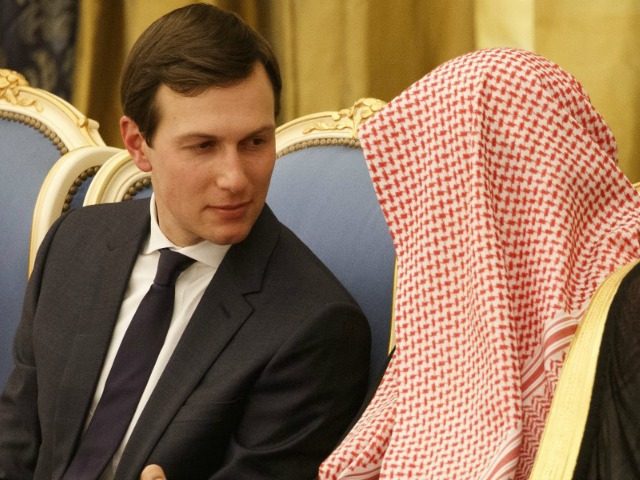Jared Kushner’s private and secret meetings with Saudi Crown Prince Mohammad bin Salman have reportedly “unsettled” intelligence and national security officials who worry that Kushner has been “freelancing” U.S. foreign policy without even having a permanent security clearance.
Bin Salman arrived in Washington on Tuesday, and Kushner is scheduled to attend multiple dinners with the crown prince, with whom he has forged a strong bond over the last year, according to a Washington Post report.
After their first official sit-down just after Trump’s inauguration, Kushner and bin Salman reportedly “consulted with one another frequently in private calls over the following months.” These private conversations that “were not always coordinated with national security or diplomatic officials” worried some national security officials, according to the Post, because “Kushner operated for the last year with an interim top-security security clearance” and “there were no official records kept of what was said on the calls.”
According to the Post, former Secretary of State Rex Tillerson was so exasperated that he once reportedly remarked, “Who is secretary of state here?”
#SaudiCrownPrince Mohammad bin Salman and the #Saudi delegation meeting with @POTUS & senior WH officials in the Cabinet Room, including @VP, @SecretaryPerry, Mike Pompeo, Jared Kushner, H.R. McMaster & Gary Cohn. pic.twitter.com/2pniBPR9F1
— Sean Doody (@swdoody) March 20, 2018
Last October, intelligence officials were reportedly caught off guard when Kushner “flew on a secretive trip to Riyadh for private meetings with the crown prince.” According to the Post, even “most people in the White House were kept out of the loop about the trip and its purpose,” and the administration later reportedly “said the purpose of Kushner’s trip was to discuss a Middle East peace plan, but declined to say with whom he met.” Though Kushner later said he met with bin Salman to “brainstorm” various strategies, intelligence officials were reportedly nevertheless “troubled by a lack of information about the topics discussed” between the two. Just days after Kushner’s visit, bin Salman put many of his political rivals and prominent business executives under house arrest at the Ritz.
The crackdown, which bin Salmon claimed was part of a larger anti-corruption effort, further consolidated his power. The timing of the arrests led many in the region to believe bin Salmon received tacit support from the Trump administration.
Those put under house arrest included: “eleven senior princes, several current or former ministers, the owners of three major television stations, the head of the most important military branch, and one of the wealthiest men in the world, who has been a major shareholder in Citibank, Twentieth Century Fox, Apple, Twitter, and Lyft.”
“It’s the equivalent of waking up to find Warren Buffett and the heads of ABC, CBS and NBC have been arrested,” a former U.S. official told the New Yorker. “It has all the appearances of a coup d’état. Saudi Arabia is rapidly becoming another country. The kingdom has never been this unstable.”
Kushner also persuaded President Donald Trump to travel to Saudi Arabia for his first foreign visit last year. The Post noted that Tillerson and Secretary of Defense James Mattis opposed the trip, and Mattis reportedly urged Trump to delay the trip for a year because it “would send the wrong signal to America’s more democratic allies around the world” and he was “skeptical of Saudi promises to help counter Iranian influence and destroy ISIS.”
Kushner has worked so closely with the Saudis that when White House Chief of Staff John Kelly recently “asked a question in an intelligence briefing about a sensitive policy matter related to Saudi Arabia in preparation for the crown prince’s visit,” intelligence officials reportedly “told him that virtually all of the conversations that U.S. officials had with the Saudis on the matter had been between Kushner” and bin Salman, according to the Post report.
Kushner recently lost access to his top-secret security clearance, and reports indicated that he was never able to obtain a permanent security clearance because of some of his clandestine meetings with foreign government officials and financiers.
The Post previously reported that officials from at least four countries—China, the United Arab Emirates, Israel, and Mexico—have discussed various ways they can manipulate Kushner “by taking advantage of his complex business arrangements, financial difficulties and lack of foreign policy experience.”
Government officials, according to the Post, were worried from the outset that “Kushner’s lack of government experience and his business debt” were “potential points of leverage that foreign governments could use to influence him.”

COMMENTS
Please let us know if you're having issues with commenting.